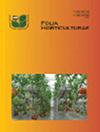First characterisation of chrysanthemum virus B infecting chrysanthemum in Thailand and development of colourimetric RT-LAMP for rapid and sensitive detection
IF 2.2
4区 农林科学
Q2 HORTICULTURE
引用次数: 0
Abstract
Abstract Chrysanthemum is among the world's most important ornamental plants because of its high economic and cultural value. Our report is the first to describe the detection of chrysanthemum virus B (CVB) in chrysanthemum leaf samples collected from Thailand, which showed yellowing and mild mottling symptoms. The coat protein sequences of CVB isolated in this study share 95.15% identity with previously characterised CVB isolates. Biological indexing found that CVB induced both local and systemic symptoms in tobacco plants, while petunia displayed systemic symptoms. To improve the rapidity and sensitivity of CVB detection, the loop-mediated isothermal amplification (LAMP) technique was developed. LAMP detection was found to be optimal when incubation was conducted at 65 °C for 45 min, wherein the LAMP reaction demonstrated 106 times higher sensitivity than polymerase chain reaction. To simplify the interpretation of results, we designed the method such that a positive result is clearly indicated based on a change of colour (colourimetry), from pink to yellow, as observed visually and via gel electrophoresis. To our best knowledge, this is the first report on the characterisation of molecular, biological and morphological characteristics of CVB infecting chrysanthemum in Thailand, along with the development of colourimetric RT-LAMP for improving detection efficiency.泰国菊花感染病毒B的首次鉴定及快速灵敏检测的比色RT-LAMP的研制
摘要菊花具有很高的经济和文化价值,是世界上最重要的观赏植物之一。本报告首次报道了从泰国采集的菊花叶片样品中检测到的菊花病毒B (CVB),其表现为泛黄和轻度斑驳症状。本研究分离得到的CVB外壳蛋白序列与先前鉴定的CVB分离株具有95.15%的同源性。生物学指标显示,CVB在烟草植株中引起了局部性和全身性症状,而矮牵牛表现出全身性症状。为了提高CVB检测的快速和灵敏度,建立了环介导等温扩增(LAMP)技术。在65℃孵育45 min时LAMP检测效果最佳,LAMP反应的灵敏度比聚合酶链反应高106倍。为了简化对结果的解释,我们设计了这样一种方法,即根据颜色的变化(比色法),从粉红色到黄色,通过视觉和凝胶电泳观察,明确表示阳性结果。据我们所知,这是泰国首次报道了CVB侵染菊花的分子、生物学和形态学特征,并开发了比色RT-LAMP,以提高检测效率。
本文章由计算机程序翻译,如有差异,请以英文原文为准。
求助全文
约1分钟内获得全文
求助全文
来源期刊

Folia Horticulturae
Agricultural and Biological Sciences-Horticulture
CiteScore
3.40
自引率
0.00%
发文量
13
审稿时长
16 weeks
期刊介绍:
Folia Horticulturae is an international, scientific journal published in English. It covers a broad research spectrum of aspects related to horticultural science that are of interest to a wide scientific community and have an impact on progress in both basic and applied research carried out with the use of horticultural crops and their products. The journal’s aim is to disseminate recent findings and serve as a forum for presenting views as well as for discussing important problems and prospects of modern horticulture, particularly in relation to sustainable production of high yield and quality of horticultural products, including their impact on human health.
 求助内容:
求助内容: 应助结果提醒方式:
应助结果提醒方式:


